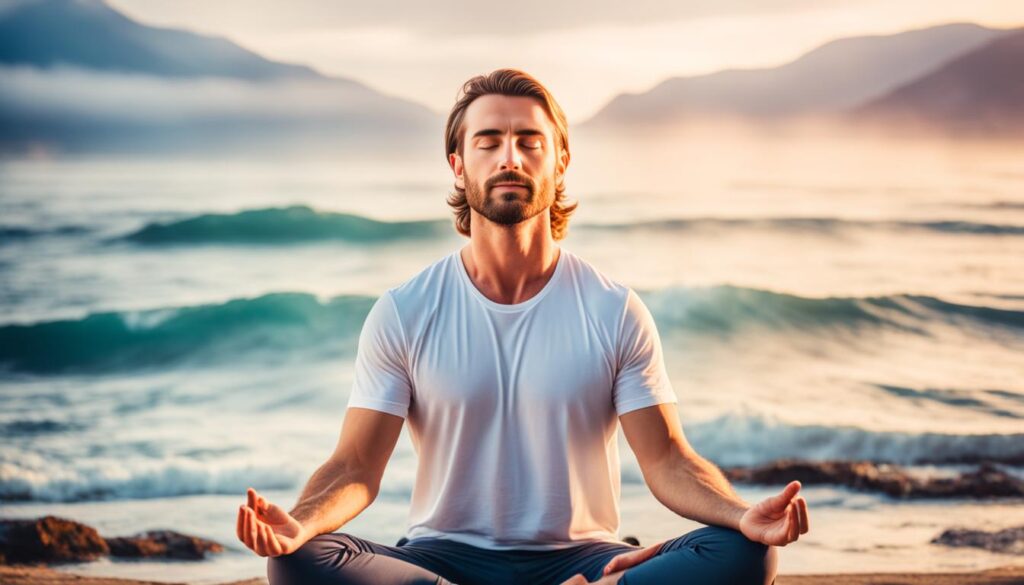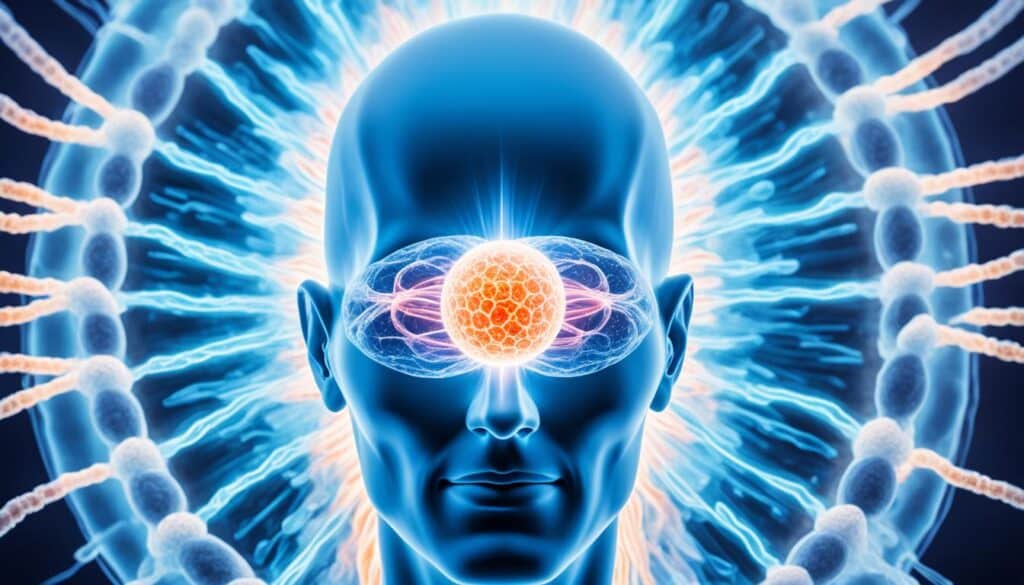Are you looking for advanced meditation techniques to achieve deep relaxation and cultivate mindfulness serenity in your life? If so, you’ve come to the right place. In this article, we will explore various advanced meditation techniques that go beyond the basics and can help you achieve a balanced life filled with calm and tranquility.
Key Takeaways:
- Advanced meditation techniques offer a path to deep relaxation and mindful serenity.
- These techniques go beyond basic meditation practices and provide a way to cultivate profound calm and tranquility.
- By incorporating advanced meditation techniques into your daily routine, you can deepen your meditation experience and unlock the many benefits that meditation offers.
- Regular meditation practice can reduce stress and anxiety, improve focus and attention, and promote a sense of inner peace and well-being.
- Exploring different types of advanced meditation, such as transcendental meditation, insight meditation, and vipassana meditation, can enhance your meditation experience.
Understanding Advanced Meditation
Advanced meditation takes meditation to a whole new level, going beyond the basic techniques commonly associated with the practice. It offers a deeper exploration of the mind, body, and emotions, allowing practitioners to tap into profound states of serenity and self-awareness. By incorporating advanced techniques into your meditation practice, you can enhance your understanding of yourself and the world around you.
Advanced meditation involves a variety of approaches and styles that are tailored to different individuals’ needs and preferences. These techniques often require a greater level of focus and concentration, enabling practitioners to dive deeper into their meditation experience. Some of the advanced techniques include:
- Mindfulness Meditation: This technique involves cultivating a heightened awareness of the present moment. It focuses on observing thoughts, emotions, and physical sensations without judgment or attachment.
- Visualization: Visualization techniques utilize mental imagery to enhance the meditative experience. Practitioners may visualize peaceful landscapes, healing light, or other calming scenes to deepen relaxation and focus.
- Mantra Meditation: Mantras are repeated words or phrases that serve as a focal point during meditation. This technique helps to quiet the mind and bring about a sense of calm and clarity.
Additionally, advanced meditation may involve specialized techniques such as insight meditation, loving-kindness meditation, or transcendental meditation. These techniques offer unique approaches to deepening your meditation practice and experiencing profound states of awareness and tranquility.
The Science Behind Advanced Meditation
“Advanced meditation techniques have been the subject of numerous scientific studies, which have demonstrated their positive impact on mental and physical well-being.”
Scientific research has shown that advanced meditation techniques can have a significant impact on our mental and physical health. Studies have indicated that regular practice of advanced meditation can:
- Reduce stress and anxiety levels
- Improve focus and attention span
- Enhance emotional well-being and overall resilience
- Promote better sleep
- Strengthen the immune system
These findings provide a scientific basis for the effectiveness of advanced meditation techniques and highlight their potential in promoting holistic well-being.
Unleash the Power of Advanced Meditation
Advanced meditation techniques offer a gateway to unlocking the full potential of your meditation practice. By exploring different types of advanced meditation and incorporating them into your daily routine, you can deepen your self-awareness, find inner peace, and cultivate a more balanced and fulfilling life.
The Benefits of Advanced Meditation
Advanced meditation offers a wide range of benefits for mental and physical health. Regular practice of meditation has been scientifically proven to have numerous positive effects on overall well-being.
Mental Health Benefits
- Stress Reduction: Advanced meditation techniques can effectively reduce stress levels, helping individuals to better manage the pressures of daily life.
- Anxiety Relief: Meditation has been shown to alleviate symptoms of anxiety and promote a sense of calmness and relaxation.
- Improved Focus: Regular meditation practice enhances concentration and attention span, resulting in improved productivity and mental clarity.
- Emotional Regulation: By cultivating mindfulness and self-awareness, advanced meditation allows individuals to better regulate their emotions and experience a greater sense of emotional balance.
Physical Health Benefits
- Lowered Blood Pressure: Meditation has been linked to a decrease in blood pressure, reducing the risk of cardiovascular diseases.
- Boosted Immune System: Regular meditation practice strengthens the immune system, leading to a higher resistance to diseases and infections.
- Improved Sleep: Advanced meditation techniques promote relaxation and relieve insomnia, resulting in improved sleep quality and overall well-restedness.
- Pain Management: Research has shown that meditation can reduce the perception of pain and improve individuals’ ability to cope with chronic pain conditions.
Overall, advanced meditation techniques provide a holistic approach to improving mental and physical health, promoting a greater sense of well-being and vitality.
Advanced meditation offers a powerful tool for enhancing both mental and physical health. Regular practice can reduce stress and anxiety, improve focus and attention, enhance emotional regulation, lower blood pressure, boost the immune system, improve sleep, and aid in pain management.
| Benefits | Mental Health | Physical Health |
|---|---|---|
| Stress Reduction | ||
| Anxiety Relief | ||
| Improved Focus | ||
| Emotional Regulation |  |
|
| Lowered Blood Pressure | ||
| Boosted Immune System |  |
|
| Improved Sleep | ||
| Pain Management |  |
Exploring Different Types of Advanced Meditation

There are many different types of advanced meditation that individuals can explore to deepen their practice. Here are three popular types:
- Transcendental Meditation:
- Involves the use of a mantra to achieve a state of deep relaxation and clarity.
- Mantras are repeated silently, helping the mind to settle and focus.
- Transcendental Meditation aims to provide profound rest and promote inner calm.
- Insight Meditation:
- Focuses on cultivating a heightened awareness of thoughts, emotions, and sensations.
- Practitioners learn to observe their inner experiences with non-judgmental awareness.
- Insight Meditation aims to gain insight into the true nature of reality.
- Vipassana Meditation:
- Emphasizes mindfulness and the development of insight into the present moment.
- Practitioners learn to observe their thoughts, emotions, and bodily sensations without attachment or aversion.
- Vipassana Meditation aims to cultivate a deep understanding of the impermanent and interconnected nature of existence.
By exploring these different types of meditation, individuals can find a technique that resonates with them and enhances their meditation experience. Whether you prefer the mantra-based approach of transcendental meditation, the introspective awareness of insight meditation, or the mindfulness and insight practice of vipassana meditation, there’s a type of advanced meditation that can take your practice to new depths.
Techniques to Deepen Your Meditation Practice

There are several techniques that can help individuals deepen their meditation practice. By incorporating these techniques into your meditation routine, you can enhance your ability to relax and cultivate a deeper state of meditation.
Deep Breathing Techniques
Deep breathing techniques, such as diaphragmatic breathing or alternate nostril breathing, can help calm the mind and promote relaxation. Diaphragmatic breathing involves breathing deeply into your abdomen, allowing your diaphragm to fully expand. Alternate nostril breathing involves inhaling through one nostril, closing it off, exhaling through the other nostril, and repeating on the opposite side. These techniques can help regulate your breath and bring focus to the present moment.
Guided Meditation
Guided meditation is a helpful practice for beginners and experienced meditators alike. It involves following along with a recorded or live instructor who provides instructions and guidance throughout the meditation session. Guided meditations can be found in various forms, such as audio recordings, smartphone apps, or online videos. They offer additional support and help you maintain focus during your meditation practice.
Mantra Meditation
Mantra meditation involves the repetition of a word or phrase as a focus for your meditation. This technique helps quiet the mind and deepen concentration. Choose a mantra that resonates with you, such as a positive affirmation or a sacred word from a spiritual tradition. Repeat the mantra silently or aloud during your meditation session, allowing it to anchor your attention and bring about a deeper meditative state.
Incorporating these techniques into your meditation practice can enhance your ability to relax, focus, and experience a deeper state of meditation. Explore these techniques and find what works best for you.
| Technique | Description |
|---|---|
| Deep Breathing Techniques | Calms the mind and promotes relaxation through techniques such as diaphragmatic breathing and alternate nostril breathing. |
| Guided Meditation | Follow along with a recorded or live instructor who provides guidance and instructions during your meditation session. |
| Mantra Meditation | Repetitive use of a word or phrase as a focus to quiet the mind and deepen concentration during meditation. |
By incorporating these techniques into your daily meditation routine, you can deepen your practice and experience the full benefits of meditation.
Cultivating Stillness and Mindfulness
Cultivating stillness and mindfulness are fundamental aspects of advanced meditation. By developing meditation habits and committing to a daily advanced meditation practice, individuals can create a sense of routine and consistency in their practice. This helps to cultivate a state of stillness and presence, allowing individuals to fully immerse themselves in the present moment and cultivate mindfulness. By incorporating mindfulness techniques into their daily lives, individuals can carry the benefits of meditation into all areas of their life.
“In stillness, the mind becomes calm, and in mindfulness, we become fully aware of the present moment.”
The Power of Stillness
Stillness is not mere physical rest; it is a state of internal quietude where the mind and body find deep relaxation. In this tranquil state, thoughts and distractions fade away, allowing us to connect with a sense of inner peace and serenity. Through advanced meditation practices, we train our minds to let go of mental chatter and embrace the profound stillness within.
Practicing Mindfulness Techniques
Mindfulness is the art of non-judgmental awareness and being fully present in the moment. By integrating mindfulness techniques into our daily lives, we can cultivate a heightened sense of awareness and attention, leading to a more centered and mindful existence.
Here are some mindfulness techniques to incorporate into your daily routine:
- Body Scan: Focus your attention on different parts of your body, being aware of any tension or sensations.
- Breath Awareness: Pay close attention to your breath as it flows in and out, anchoring yourself in the present moment.
- Sensory Awareness: Engage your senses fully in any activity, whether it’s eating, walking, or listening to music.
By practicing these techniques regularly, you will develop a heightened state of mindfulness and deepen your meditation practice.
Creating Meditation Habits
To harness the full benefits of advanced meditation, it is crucial to establish meditation habits. By incorporating meditation into your daily routine, you ensure that it becomes an integral part of your life. Set aside a dedicated time and space for your daily practice, whether it’s in the morning, during lunch breaks, or before bed. Consistency is key to cultivating stillness and mindfulness.
Cultivating Stillness and Mindfulness
| Meditation Habits | Mindfulness Techniques |
|---|---|
| Establish a daily meditation routine | Practice body scan, breath awareness, and sensory awareness |
| Create a dedicated meditation space | Engage in mindful eating, walking, and listening |
| Set aside specific meditation time | Cultivate non-judgmental awareness |
By incorporating these meditation habits and mindfulness techniques into your daily life, you will experience a profound sense of stillness, presence, and mindfulness. Embrace the transformative power of advanced meditation and unlock a deeper connection to yourself and the world around you.
Going Beyond the Basics

When it comes to meditation, going beyond the basics means exploring advanced techniques and practices that delve deeper than what most people are doing. These advanced techniques can take your meditation practice to the next level and help you experience profound states of meditation.
One such advanced technique is insight meditation. With insight meditation, the focus is on observing the nature of your own mind and gaining insight into the true nature of reality. This practice involves closely examining your thoughts, emotions, and sensations, allowing you to develop a deep understanding of yourself and the world around you.
Insight meditation is a powerful tool for self-discovery and personal growth. By exploring the depths of your own mind, you can gain valuable insights and transform your perspective on life.
By going beyond the basics of meditation and incorporating advanced techniques like insight meditation, you can deepen your meditation practice and unlock new levels of consciousness. This advanced technique allows you to tap into the depths of your being and experience profound states of meditation that go beyond mere relaxation.
As you continue to explore advanced techniques, remember that meditation is a journey of self-discovery and growth. It’s important to approach your practice with patience, persistence, and an open mind. Embrace the opportunities for insight and transformation that advanced meditation techniques offer, and let them guide you on your path to deep meditation and self-awareness.
Incorporating Advanced Meditation Into Your Daily Routine
In order to deepen your practice and experience the full benefits of advanced meditation, it is important to incorporate it into your daily routine. By setting aside dedicated time each day, you can make meditation a priority and ensure that it becomes a regular part of your day.
Whether it’s in the morning, during a lunch break, or before bed, finding a consistent time that works for you is key to establishing a daily meditation practice. By making it a part of your routine, you will create a habit that becomes natural and effortless.
Here are some tips to help you incorporate advanced meditation into your daily routine:
- Choose a specific time: Find a time of day that works best for you. It could be early in the morning before the distractions of the day begin, during your lunch break to reset and recharge, or in the evening as a way to wind down before bed.
- Create a dedicated space: Designate a quiet and peaceful space where you can meditate without distractions. Decorate it with objects that promote relaxation and serenity.
- Set a timer: Use a timer to ensure that you allocate a specific amount of time for each meditation session. Start with a manageable duration, such as 10 minutes, and gradually increase it as you become more comfortable.
- Be consistent: Make a commitment to yourself to meditate every day. Even if you can only spare a few minutes, consistency is key to progress in your practice.
Remember, meditation is a personal journey, and finding what works best for you is important. Experiment with different times of day, durations, and techniques to discover what resonates with you.
“Meditation is not a means to an end. It is both the means and the end.” – Jiddu Krishnamurti
The Science and Research Behind Advanced Meditation

Extensive scientific research has been conducted on the mental and physical health benefits of meditation, including advanced meditation techniques. Studies have shown that regular meditation practice can have a positive impact on brain function, emotional well-being, and overall health. The research has also highlighted the importance of long-term practice and consistency in order to experience the full benefits of meditation. By understanding the science behind advanced meditation, individuals can gain confidence in its effectiveness and make it a valuable part of their wellness routine.
Research has consistently shown that meditation has a multitude of benefits for mental and physical health. A study published in the Journal of Psychosomatic Research found that meditation can reduce stress, anxiety, and symptoms of depression. Another study, published in the journal JAMA Internal Medicine, showed that regular meditation practice can lower blood pressure and reduce the risk of heart disease.
The benefits of meditation are not limited to mental and physical health. Meditation has also been found to improve cognitive function, enhance creativity, and increase focus. A study conducted at the University of California, Santa Barbara, found that participants who practiced meditation showed significant improvements in their ability to focus and sustain attention compared to those who did not practice meditation.
“Meditation is a powerful tool that can positively impact both the mind and body,” says Dr. Richard Davidson, a renowned neuroscientist and meditation researcher. “Scientific research has consistently demonstrated the numerous benefits of regular meditation practice, including improved emotional well-being, reduced stress, enhanced cognitive function, and increased resilience.”
“Meditation is a powerful tool that can positively impact both the mind and body. Scientific research has consistently demonstrated the numerous benefits of regular meditation practice, including improved emotional well-being, reduced stress, enhanced cognitive function, and increased resilience.”
The Benefits of Meditation for Mental and Physical Health
Scientific research has shown that meditation has a wide range of benefits for mental and physical health. Here are some of the key findings:
| Benefits of Meditation | Scientific Evidence |
|---|---|
| Reduced stress and anxiety | A study published in the Journal of Clinical Psychology found that meditation can significantly reduce symptoms of stress and anxiety. |
| Improved emotional well-being | Research conducted at the University of Massachusetts Medical School found that mindfulness meditation can improve emotional well-being and reduce symptoms of depression. |
| Enhanced cognitive function | A study published in the journal Psychological Science found that meditation can improve cognitive function, including attention, working memory, and cognitive flexibility. |
| Reduced risk of heart disease | Research published in the journal Circulation: Cardiovascular Quality and Outcomes found that meditation can lower blood pressure and reduce the risk of heart disease. |
These findings highlight the significant impact that regular meditation practice can have on both mental and physical well-being. By incorporating advanced meditation techniques into your daily routine, you can experience profound benefits and improve your overall quality of life.
Tips for Deepening Your Meditation Practice
Deepening your meditation practice requires dedication and patience. By incorporating these tips into your meditation sessions, you can progress in your practice and deepen your meditation experience:
1. Set a Regular Schedule
Establish a consistent meditation routine by setting aside specific times each day for your practice. This regularity helps train your mind and body to enter a meditative state more easily.
2. Create a Peaceful Environment
Designate a quiet and serene space for your meditation sessions. Remove distractions and create an atmosphere that promotes calmness and relaxation. Consider incorporating soothing elements such as candles, soft lighting, or nature sounds to enhance the ambiance.
3. Start with Short Sessions
If you’re new to meditation or trying to deepen your practice, begin with shorter sessions and gradually increase the duration over time. This approach allows you to build endurance and slowly acclimate your mind and body to longer periods of meditation.
4. Focus on Your Breath
Concentrating on your breath is a powerful way to anchor yourself in the present moment. Pay attention to the sensation of each inhale and exhale, allowing your breath to guide you deeper into your meditation practice. If your mind wanders, gently return your focus to your breath.
5. Incorporate Guided Meditations
Utilize guided meditation recordings or apps to provide structure and guidance during your sessions. These resources can help deepen your meditation by leading you through different techniques and providing insights and instructions along the way.
6. Experiment with Different Techniques
Explore various meditation techniques, such as mindfulness, loving-kindness, or body scan, to discover what resonates with you. Trying different approaches can help deepen your practice and provide new insights and experiences.
7. Cultivate Gratitude
Take a few moments before or after each meditation session to express gratitude. Reflect on the positive aspects of your life and embrace a mindset of appreciation. This practice can enhance your overall well-being and deepen the transformative effects of meditation.
“Meditation is not a means to an end. It is both the means and the end.” – Jiddu Krishnamurti
| Tips | Description |
|---|---|
| 1 | Set a Regular Schedule |
| 2 | Create a Peaceful Environment |
| 3 | Start with Short Sessions |
| 4 | Focus on Your Breath |
| 5 | Incorporate Guided Meditations |
| 6 | Experiment with Different Techniques |
| 7 | Cultivate Gratitude |
By implementing these tips, you can deepen your meditation practice, progress in your journey, and experience the transformative benefits of regular meditation sessions.
Overcoming Challenges in Advanced Meditation

Advanced meditation can present its own set of challenges. Staying present and focused during meditation can be difficult, especially as the mind tends to wander. However, by practicing patience, persistence, and non-judgmental awareness, individuals can overcome these challenges and deepen their meditation practice. It’s important to remember that meditation is a journey, and each session offers an opportunity for growth and deepening.
When faced with challenges in advanced meditation, one key strategy is to cultivate a sense of patience. Accept that the mind will wander and gently guide your focus back to the present moment. Rather than becoming frustrated or judgmental, approach each distraction with curiosity and kindness. This non-judgmental awareness can help you stay present and centered in your meditation practice.
Persistence is also crucial when confronting challenges in advanced meditation. It’s normal to encounter obstacles and distractions along the way, but consistent practice will strengthen your ability to overcome them. Set aside dedicated time for meditation each day, even if it’s just a few minutes, and commit to showing up for yourself and your practice. Over time, your meditation practice will deepen as you develop resilience and perseverance.
“The mind is restless, turbulent, obstinate and very strong, O Krishna, and to subdue it I think, is more difficult than controlling the wind.” – Bhagavad Gita
Another effective technique for overcoming challenges in advanced meditation is to deepen your awareness of the present moment. Instead of trying to suppress or eliminate thoughts, simply observe them with curiosity and detachment. This mindfulness practice allows you to develop a deeper understanding of your own mental patterns and gently release any attachments or aversions that may arise during meditation.
Additionally, incorporating other mindfulness techniques into your daily life can support your meditation practice. Take moments throughout the day to pause, breathe, and bring your attention to the present moment. This can help you stay connected to your meditation practice outside of formal meditation sessions and reinforce your ability to stay present.
Remember, overcoming challenges in advanced meditation is not about achieving a perfect state of mind or complete stillness. It’s about developing a compassionate and non-judgmental relationship with your thoughts, emotions, and experiences. Each meditation session is an opportunity for growth and deepening, so embrace the journey and trust in the process.
| Challenges in Advanced Meditation | Strategies for Overcoming |
|---|---|
| Wandering mind | Cultivate patience and gently guide your focus back to the present moment. Approach distractions with curiosity and kindness. |
| Obstacles and distractions | Practice persistence by setting aside dedicated time for meditation each day. Show up for yourself and your practice consistently. |
| Attachments and aversions | Deepen your awareness of the present moment and develop a mindfulness practice. Observe thoughts with detachment and release attachments or aversions. |
Conclusion
Advanced meditation techniques provide a powerful way to achieve deep relaxation and cultivate mindful serenity. By incorporating these techniques into your daily routine and committing to a regular meditation practice, you can unlock the profound benefits of meditation and create a balanced life. Whether you are just starting your meditation journey or have years of experience, exploring advanced meditation techniques can deepen your practice and enhance your overall well-being.
During your meditation practice, take the time to explore different techniques and find the ones that resonate with you. This might involve focusing on specific sensations, using mantras or visualizations, or deepening your awareness of the present moment. By experimenting with different approaches, you can discover what works best for you and cultivate a fulfilling meditation practice.
Remember, the journey of advanced meditation is ongoing. It requires commitment and dedication to establish a consistent practice. By making meditation a priority in your daily life, you can experience the transformative effects it can have on your mental, emotional, and physical health. Embrace the journey of advanced meditation and open yourself up to a world of deep relaxation, mindfulness serenity, and a more balanced life.
Also Refer : Discover Funny Yoga Poses For A Good Laugh
FAQs
Q: What are advanced meditation techniques?
A: Advanced meditation techniques are advanced practices of meditation that go beyond basic mindfulness and concentration. These techniques are often used by experienced meditators to deepen their practice and achieve deeper states of relaxation and insight.
Q: How can advanced meditation techniques help with deep relaxation?
A: Advanced meditation techniques help with deep relaxation by allowing the practitioner to access deeper states of consciousness and relaxation. These techniques often involve focused attention, body scanning, and visualization to induce a state of deep relaxation.
Q: What are some popular types of advanced meditation techniques?
A: Some popular types of advanced meditation techniques include insight meditation, vipassana meditation, samatha meditation, and Tibetan Buddhist meditation practices. These techniques are known for their ability to induce deep states of relaxation and insight.
Q: How can I incorporate advanced meditation techniques into my daily routine?
A: You can incorporate advanced meditation techniques into your daily routine by setting aside dedicated time for practice, finding a quiet and comfortable space to meditate, and gradually introducing more advanced techniques into your meditation sessions as you become more experienced.
Q: Can advanced meditation techniques be beneficial for long-term meditation practitioners?
A: Yes, advanced meditation techniques can be highly beneficial for long-term meditation practitioners. These techniques offer new ways to deepen one’s practice, overcome plateaus, and experience profound states of relaxation and insight.
Q: What are the key differences between basic and advanced meditation techniques?
A: The key differences between basic and advanced meditation techniques lie in the level of complexity, depth of practice, and the ability to induce deeper states of relaxation and insight. Advanced techniques often require more focus, discipline, and experience to master.
Q: How can advanced meditation techniques benefit the body and mind?
A: Advanced meditation techniques can benefit the body and mind by reducing stress, enhancing mental clarity, improving emotional regulation, and promoting overall well-being. These techniques have been shown to have a positive impact on both physical and mental health.
Q: Are there specific advanced meditation techniques that focus on mindfulness?
A: Yes, there are advanced meditation techniques that focus specifically on mindfulness, such as satipatthana meditation and insight meditation. These practices emphasize the cultivation of moment-to-moment awareness and deepening one’s understanding of the nature of the mind and consciousness.
Q: What is the best way to learn and practice advanced meditation techniques?
A: The best way to learn and practice advanced meditation techniques is to seek guidance from experienced teachers or practitioners, attend retreats or workshops dedicated to advanced meditation, and gradually incorporate these techniques into your daily practice with patience and perseverance.
Q: Are there specific advanced meditation techniques that involve focusing on the breath?
A: Yes, there are advanced meditation techniques that involve focusing on the breath, such as pranayama and Tibetan Buddhist breath meditation. These techniques use the breath as a focal point to cultivate deep relaxation, concentration, and insight.













